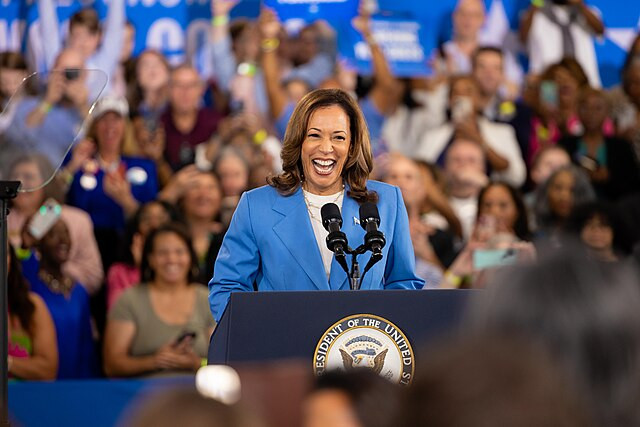As Kamala Harris solidifies her position as the Democratic presidential candidate following the Democratic National Convention, her policy proposals are facing heightened scrutiny. During a roundtable discussion at the convention, Brian Nelson, Harris' senior policy adviser, fielded numerous questions about the core policies of her campaign.
Among the queries were whether Harris would seek to revive the Iran nuclear deal, how she planned to fund expanded child tax credits, and her strategy to assist first-time homebuyers. Nelson repeatedly responded with a cautious refrain, stating, "I am not going to get ahead of the vice president," a line he reiterated eight times during the 45-minute event.
Harris, who accepted her party's nomination with a speech that outlined strong foreign policy principles, pledged to stand up to Russia and North Korea, defend Israel's right to self-defense while supporting Palestinian self-determination, and tackle domestic issues such as a middle-class tax cut, ending America's housing shortage, and securing the southern border. While the speech energized her Democratic base, it was more focused on broad principles rather than specific policy details, a reflection of her recent entry into the race after President Joe Biden's decision to abandon his reelection campaign under party pressure.
The lack of detailed policy plans is partly strategic. Harris' campaign has been deliberately vague on certain issues, such as energy policy, to avoid providing ammunition for attacks from Republican candidate Donald Trump and his campaign.
Harris' aides describe this approach as "strategically ambiguous," focusing on "value statements" rather than granular policy details and leaving voters to "connect the dots" themselves. This strategy has so far proven effective, with Harris experiencing a surge in donations, improved polling numbers, and an overall wave of enthusiasm since she became the Democratic candidate.
However, as the campaign heads into its final stretch with just 75 days until Election Day, Harris will face increasing pressure to flesh out her policy positions. Chauncey McLean, founder of the super PAC Future Forward, which backs Harris, noted that voters are beginning to ask more pointed questions about her plans and what she intends to do to improve their lives. The campaign's cautious approach may need to evolve as Harris prepares for at least one televised debate against Trump in September, along with national interviews that will demand more substantive policy discussions.
Harris' campaign has been careful to balance continuity with the Biden administration while positioning herself as the leader of a new generation. This dual strategy has helped her gain ground against Trump in the polls, turning the race into a competitive contest. Despite the challenges, Harris has adjusted her stance on certain issues, such as reversing her support for a ban on hydraulic fracking and a single-payer health system, positions she previously endorsed during her unsuccessful 2020 presidential bid.
As Harris prepares for the final campaign push, her team plans to focus on battleground states like Arizona, Georgia, and Pennsylvania, which are crucial to securing a victory in November. At the convention in Chicago, Democratic leaders expressed confidence in Harris' ability to address critical issues, with Senate Majority Leader Chuck Schumer urging the public to have faith in her environmental agenda.
Despite some concerns about the lack of detailed policies, the mood among Democrats remains optimistic. Many see Harris as a candidate who, while still defining her platform, represents a fresh approach and a break from the divisive politics of the past. For some, the choice between Harris and Trump is clear, even if Harris' policies are still being fleshed out. As U.S. Representative Jim Costa remarked, comparing Harris to Trump, "Compared to the other guy, give me a break. He's talking about electric boats and sharks and how he's better looking. Give me a break."






